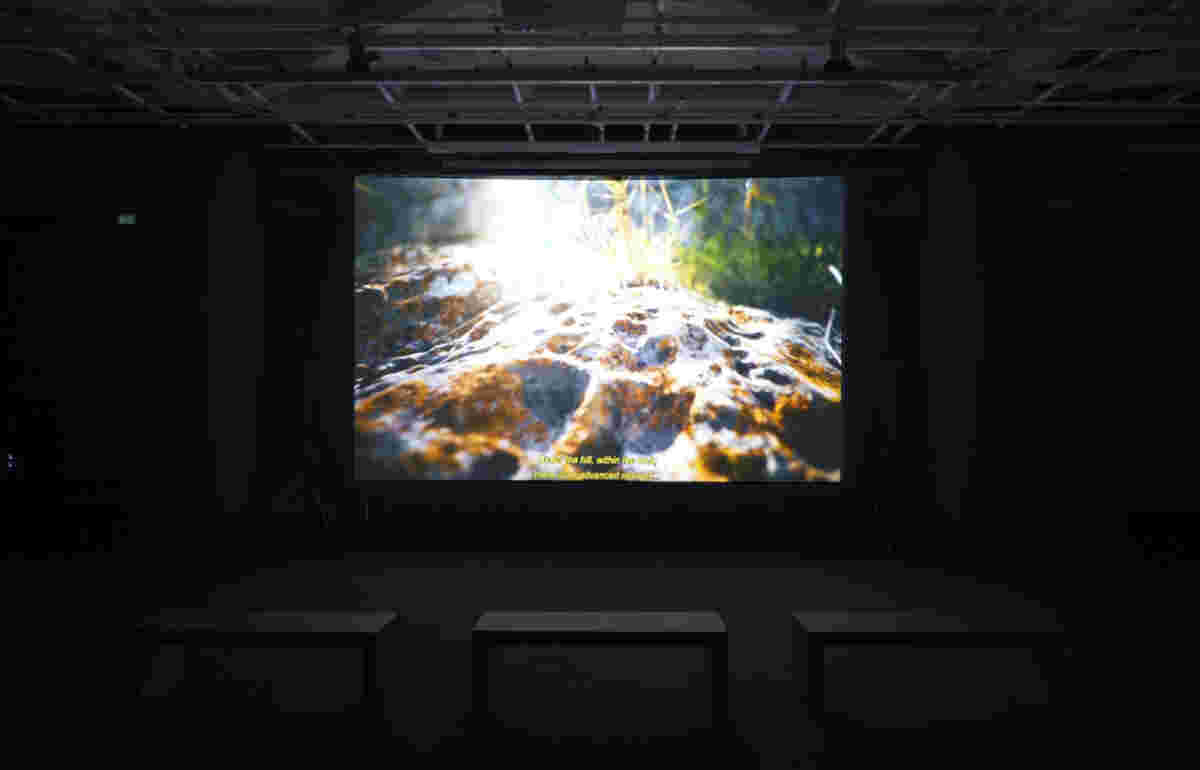
KYRIAKI GONI | “DATA GARDEN”
A solo show by Kyriaki Goni at Blenheim Walk Galler, Leeds Art University.
A story of small secret communities unfolds throughout the exhibition revealing their efforts to protect the plants whilst experimenting on new technologies of storing data in the plants’ DNA. Almost as if Haraway’s cyborg becomes a fusion of plant/machine in a revolutionary process of converting plant life into memory devices, disrupting hegemonic surveillance practices and processes of extractivism.
Data centres, one of the main digital ecosystems, allow us to store and share information, providing access to applications and data at great environmental costs. As the number of technological mega-infrastructures is constantly increasing across the world, so is the impact of digital activity on the natural environment; energy and water consumption, greenhouse gas emissions, waste, land use and biodiversity are some of the areas affected. Today’s climate emergency brings into question the growing demand of data centres to sustain our current techno-dependent practices, seeking for alternative solutions. Thus, the data garden communities advocate not only on privacy and informational self-determination but also on environmentally conscious and effective data management.
The mountain islands shall mourn us eternally (Dolomites Data Garden) 2022, presents the latest Data Garden community and a plant; a hybrid of Ortiseia leonardii, a conifer fossil 260 million years old, and Saxifraga depressa, a rare white flower that grows only on the summits of the Dolomites between 2000 and 2850 meters. The Dolomites, an ecosystem of high plant biodiversity in the Alps, has been recognized as one of the richest areas of endemism; they are also one of the most intensively exploited regions in the world. Mass tourism infrastructure continues to present a threat to the landscape resulting in habitat change and pollution. Excessive development, over-exploitation of land and climate warming necessitate the migration of plant species from lower altitudes to the summits, shifting to new territories in pursuit of more suitable and colder microclimates.
The installation begins with a CGI video in which the hybrid plant addresses humanity on behalf of its entire species. Information stored in plants’ DNA advocates for non-human communication protocols and technoshamanic interspecies communities spread across the Earth. Through an alluring simulation the transmission shares a planetary chronicle of deep time, geological transformations, and plant history along with an ominous future of forced migration. The mountain top then becomes the end of this journey, the last destination before extinction. Seemingly to an extraterrestrial transmission in reverse. The message demonstrates the diversity of life and technological achievements on Earth only this time from a plant’s non-anthropocentric perspective. It endorses human signals and language as a means of communication. Alongside the film, there is a sculpture; a wooden representation of the hybrid plant, produced in collaboration with local makers in the Ortisei region. And a set of four screen prints that depict digital drawings and notes documenting the artist’s creative process.
A way of resisting (Athens Data Garden) 2020 focuses on the first Data Garden and the plant Micromeria acropolitana, a small and humble perennial species, considered extinct for almost a century until its rediscovery in 2006. Endemic to the Acropolis hill – an archaeological site with more than sixteen thousand visitors per day, human disturbance becomes the plant’s greatest threat. Kyriaki Goni takes the species’ vulnerability as a point of departure to present a fictional story of a secret community’s efforts to preserve plant life and data privacy. In doing so the artist invites us to imagine a network of plant/machines operating as data storage devices, utilising experimental scientific methods that allows for information to be stored into a plant’s DNA. The installation’s fractured storyline does not unfold as a precise linear sequence, but rather reveals the interconnectedness, inseparability, and synthesis of natureculture.
In Kyriaki Goni’s Data Garden fiction and scientific facts are intertwined in an attempt to provide alternative futures and forms of resistance. Prints, videos, interviews with scientists, a sculpture, a polyphonic sound installation, and an Augmented Reality application are coming together to offer the potential for new insights into multi-layered, socio-eco-technological relationships. Data Garden invites us to critically evaluate the climate impact of digital technology with particular focus on the growing demand for data storage and the expansion of data centres’ infrastructures. Potential alternative storage solutions are proposed by the artist as imaginaries of a sustainable future. The exhibition brings together the two data gardens for the first time as a proposition of glocal, eco-technological networks of human and plant life promoting synergy, care, and solidarity.
KYRIAKI GONI | DATA GARDEN
Preview & Panel Discussion: Thursday 19 January 2023
4:30-5:30pm Panel Discussion (Auditorium)
5:30-7:30pm Preview (Blenheim Walk Gallery)
Leeds Arts University, LS2 9AQ
Free entry. Booking not required.
20 January – 1 April 2023
Monday to Saturday, 10am-4pm
Blenheim Walk Gallery, LS2 9AQ
*Kyriaki Goni is a visual arts SNF ARTWORKS Fellow 2018